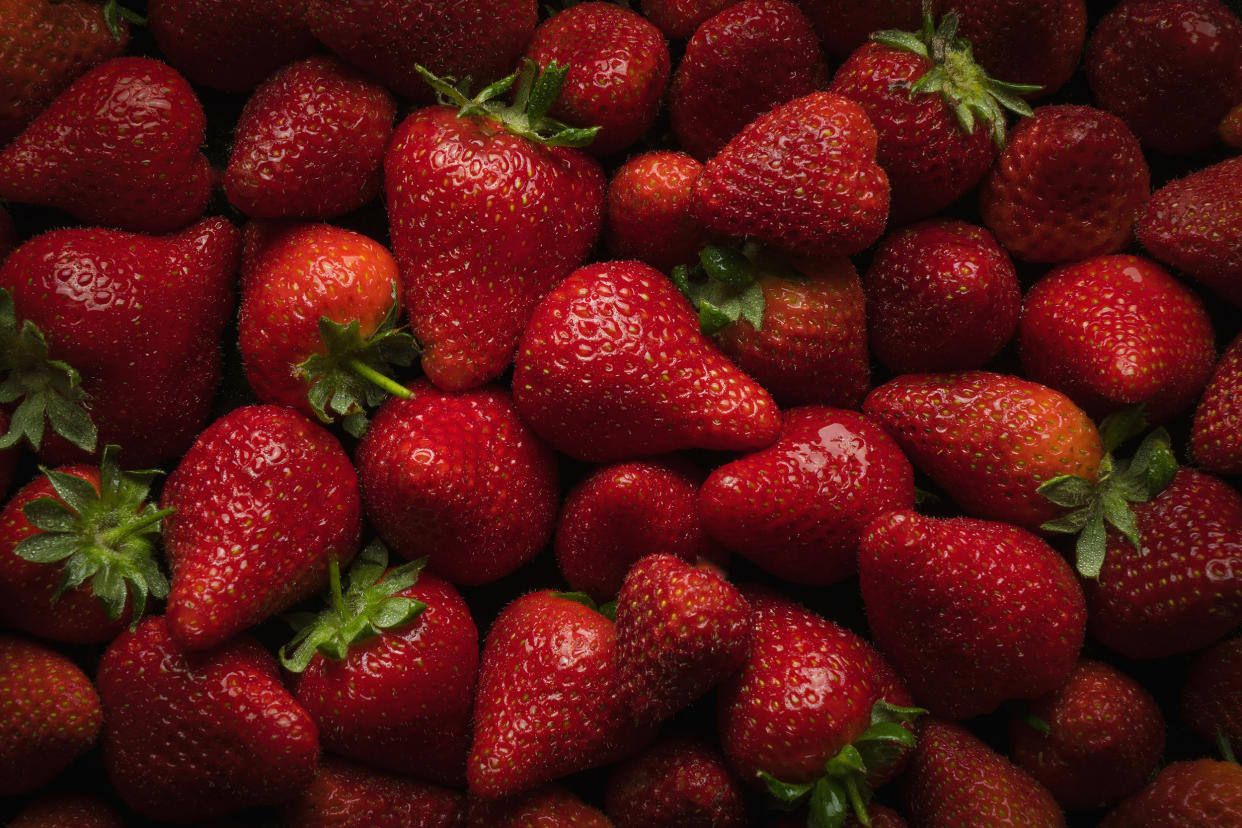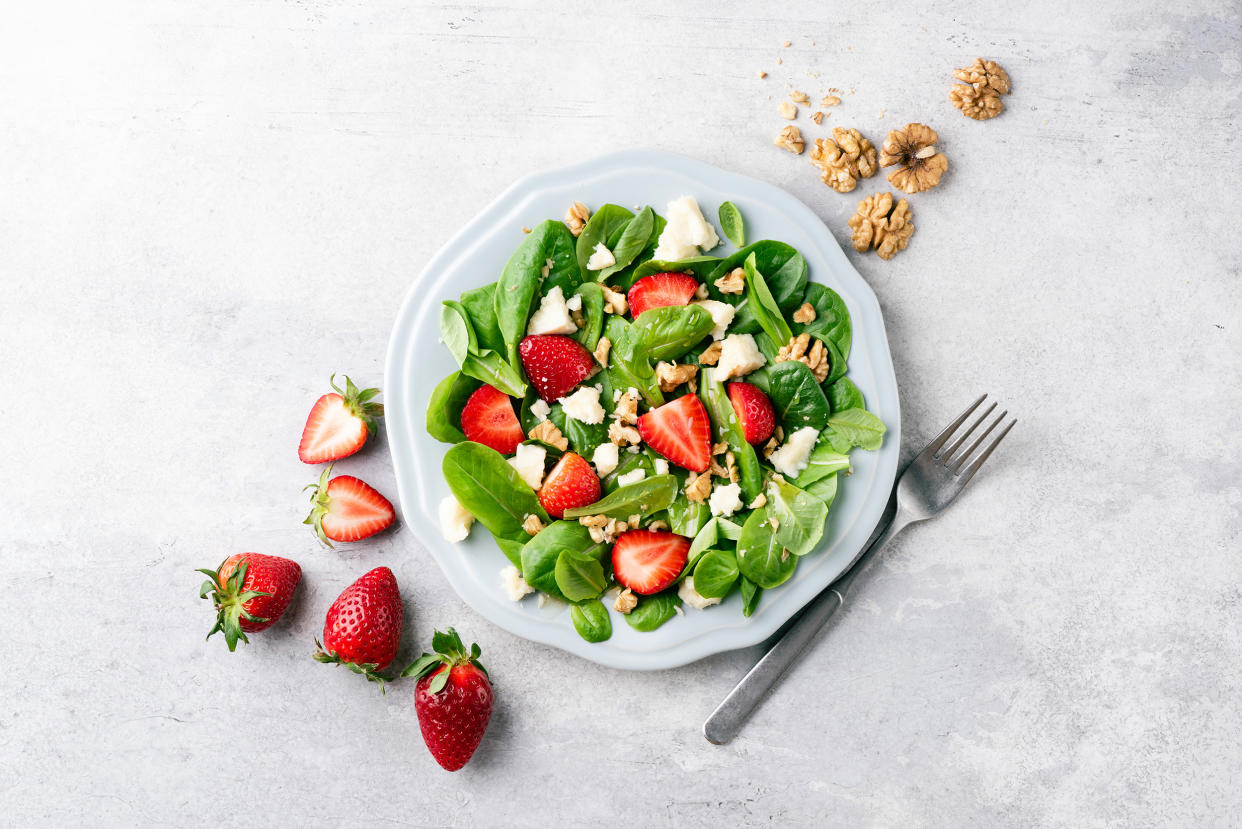Strawberries have been upgraded to ‘super fruit.’ Here are their surprising health benefits
The luscious strawberry is more than just a fruit to cover with chocolate as a Valentine's treat. Strawberries, it turns out, are actually small nutritional powerhouses. So, in addition to being juicy and delicious, strawberries are packed with surprising health benefits.
Some experts consider strawberries a kind of "super fruit" because, even though they're small, they have loads of vitamins and other beneficial compounds. In other words, strawberries are deliciously nutrient-dense. “Strawberries are loaded with flavonoids and other health-protective plant nutrients, so think of them as a super fruit,” says Jackie Newgent, RDN, CDN, New York City-based plant-forward chef and culinary nutritionist.
The plant compounds in strawberries have been linked with many health benefits — like reduced blood pressure and cholesterol and improvements in insulin resistance. This gorgeous berries also pack an antioxidant punch that may help ward off nasty inflammation. Let’s dive into all of reasons why you should add strawberries to your diet and explore fun ways to eat them.

The health benefits of eating strawberries
Strawberries pack a big nutritional punch into a small package. With vitamins, minerals, antioxidants and beneficial plant compounds, strawberries play a positive role in many health conditions. “It’s recommended to eat 8 strawberries a day,” says Newgent. “That counts as a serving of strawberries, and it’s the amount that research suggests may help reduce the risk of certain cancers, boost brain and heart health, and manage Type 2 diabetes,” she adds.
Strawberries can boost heart health
There are several studies linking strawberries to heart health. A recent study of adults with obesity and high cholesterol found that eating 2.5 servings of strawberries per day for four weeks improved insulin resistance and LDL cholesterol levels. Another randomized controlled trial looked at adults with cardiometabolic risk factors found that eating 2.5 servings of strawberries per day for four weeks improved endothelial (the membrane in heart and blood vessels) function and antioxidant status.
Strawberries are a great source of vitamin C
“Strawberries are an excellent source of vitamin C, which plays a role in immune function and fighting free radicals associated with cancer and heart disease,” says Newgent. Most of the research on strawberries and cancer consists of animal studies, but the research shows promising results. For example, research on mice concluded that consuming strawberries inhibits tumor growth and promotes the death of cancer cells in those with breast cancer.
Strawberries contain a very special antioxidant
It’s no surprise that strawberries are closely aligned with reductions in cancer because they contain an ellagic acid, an antioxidant that has anti-inflammatory effects, according to Newgent. Ellagic acid has been shown to prevent or slow down the progression of certain chronic diseases — including heart disease, cancer, cognitive decline and Diabetes. This antioxidant also has protective properties for the liver, kidneys, skin and other organs.
Are there drawbacks to eating strawberries?
There really are no downsides to eating strawberries. They are tasty, nutritious and easy to snack on. Some worry about the fact that strawberries are in the “Dirty Dozen,” a list compiled by the Environmental Working Group (a group that investigates harmful agricultural practices) that highlights produce with the most pesticides.
But the reality is that it's nearly impossible to avoid pesticides in our food, and a lot of experts agree that the health benefits of eating strawberries outweighs any of the — mostly hypothetical — drawbacks.
Joshua Lambert, associate professor of Food Science at Penn State, previously told TODAY that pesticide residues found on items like strawberries are relatively low and people aren’t usually eating them every day. “It’s a great idea to not be exposed at all, but it’s not realistic,” he said, noting that many Americans already don’t eat enough fruits and vegetables.
Fun facts about strawberries
Although you may eat them often, chances are you may not know these interesting tidbits about strawberries.
One serving of strawberries has 100% of your daily vitamin C
Oranges get all the credit when it comes to immune boosting, but strawberries have just as much vitamin C as citrus. One serving (8 strawberries) has all the vitamin C you need in a day. This water-soluble vitamin is well known for its role in the immune system, but it also has many other parts to play in the body.
Vitamin C is responsible for synthesizing collagen, a protein that facilitates joint and skin health. Vitamin C is also necessary for wound healing and increases the absorption of iron. Lastly, vitamin C is an antioxidant that helps fight off harmful inflammation causing free radicals.
You can eat the strawberry tops
“The green caps on strawberries are called calyxes — and they’re 100 percent edible,” says Newgent. She recommends cleaning them well before using them in cooking. A really simple way to use the tops is to slice them off and drop them in a glass of water for a strawberry-infused spa water. You can also throw a whole strawberry into a smoothie and let the top count towards your daily greens.
Strawberries taste best at room temperature
“You’ll get the most flavor from strawberries at room temperature — so let them stand at least 15 minutes after removing them from the fridge,” says Newgent. Strawberries are fully ripe at the time of picking, so they should be refrigerated or frozen to maintain freshness.
Since strawberries have a limited season, consider freezing them to enjoy the bounty year-round. Simply rinse, blot dry, remove the stems and place on a parchment-lined baking sheet. Freeze for 24 hours, then transfer to a storage bag or container for up to six months.

Strawberry nutrition facts
One cup of whole strawberries has:
46 calories
1 gram protein
0 grams fat
11 grams carbohydrates
3 grams fiber (12% daily value (DV))
35 ug folate (8% DV)
85 milligrams vitamin C (100% DV)
Healthy strawberry recipes
Strawberries are versatile fruit that can be used in sweet and savory dishes. Whether you make them the star of the show in a dessert or add a little sweetness to the main dish, you won’t regret using strawberries in any recipe. Here are some creative options:
Dessert: “I adore the pairing of chocolate and strawberries. Dark chocolate-covered strawberries are one of my all-time favorite desserts,” says Newgent.
They also add brightness to this traditional Italian dessert in a Strawberry Tiramisu. And you’ll always impress your guests with an Old-Fashioned Strawberry Shortcake.
Savory dishes: “When I’ve got lots of fresh strawberries on hand, I enjoy using them as a naturally sweet option in place of tomatoes, like in fresh strawberry pico de gallo, spicy guacamole spiked with strawberries or balsamic strawberry bruschetta,” says Newgent. They also go really well in a traditional salad, like this Grilled Shrimp Salad with Strawberries or a grain salad, such as Giada’s Millet Tabbouleh Salad with Strawberries. Plus, strawberries add richness to sauces like in this Fennel Fried Chicken with Strawberry Rhubarb Sweet and Sour Sauce
Snacks: “For a really fun snack, I recreated the concept of “Tootsie Pops” in my Strawberry-Walnut Lollipops,” says Newgent. Ditch the storebought Pop Tarts and try Siri’s Homemade Strawberry Breakfast Pockets instead. Or whip up this simple high protein Chocolate Strawberry Frozen Yogurt Bark.
This article was originally published on TODAY.com
